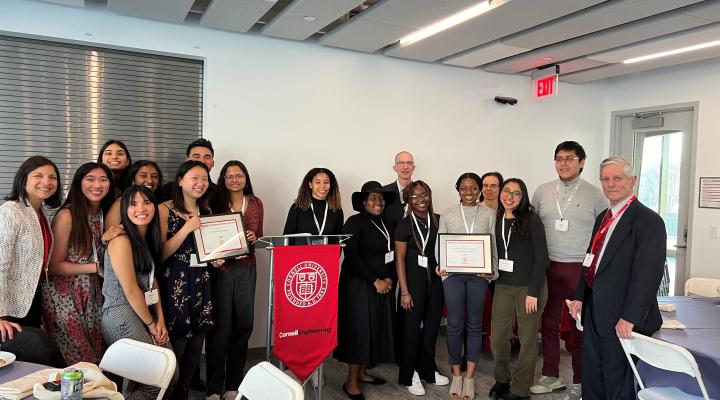Andrea Giometto joined the faculty of Cornell’s School of Civil and Environmental Engineering (CEE) as an assistant professor in July 2020. Most recently, Giometto held a postdoctoral fellowship in the Department of Physics and the Department of Molecular and Cellular Biology at Harvard University.
Giometto’s research relies on statistical and nonlinear physics methods, experiments with microbes, and genetic engineering to examine the spatial growth of microbial communities. Much of his research is fundamental, with the hope of understanding how ecological and evolutionary processes play out in spatially extended populations.
Giometto grew up in Italy and attended the University of Padua, where he earned both a B.S and an M.S. in physics. Giometto also earned a Certificate of Completion from the Galilean School of Higher Education at the University of Padua. This school is a special unit of the university open to just thirty students per year and designed to foster an intellectually stimulating environment where students from many disciplines can live and work and study together. Giometto credits his involvement in the Galilean School with his exposure to biology and his wish to apply fundamental knowledge of physics to “build up a theory about how communities and populations work.”
From Padua, Giometto moved to Lausanne, Switzerland where he received his Ph.D. in civil and environmental engineering at the Ecole Polytechnique Federale de Lausanne (EPFL), one of Europe’s premier technical universities. His doctoral work on the role stochastic fluctuations play in shaping ecological patterns and processes earned him the award for Best Ph.D. Thesis in the Earth Sciences.
Since earning his doctorate, Giometto has been in his postdoctoral fellowship at Harvard, where he used genetic engineering techniques to investigate experimentally the spatiotemporal dynamics of microbial populations. (His research at Harvard was supported by Postdoctoral Fellowships from the Swiss National Science Foundation.)
He was excited to join the faculty at Cornell this summer. “When we came to visit campus, both my wife and I were impressed by how enthusiastic everyone was,” says Giometto. (Giometto’s wife is Francesca Parise, assistant professor in Cornell’s School of Electrical and Computer Engineering.) “Also, there are several groups doing exciting work on topics related to my research, so I feel like there are lots of possibilities for collaboration with people from many departments.”
Giometto is eager to continue the work he started in his postdoc at Harvard. He hopes his work will guide other researchers as they start to focus on manipulating microbiomes. “You need to know what are the conditions under which you can successfully introduce or control a new microbial strain,” says Giometto. “One of the first things is doing these kinds of experiments.” Giometto uses genetically modified strains of yeast and bacteria to investigate the spatiotemporal dynamics of biological invasions, how biological interactions such as cooperation and conflict affect ecological and evolutionary processes in spatially extended landscapes, how competition for resources affects the coexistence of multiple species in microbial communities, and how scaling patterns characterizing the distribution of species, their abundances, and body sizes emerge in natural ecosystems.
Giometto will be teaching CEE 6055: Noise in Biology & Environmental Sciences in the fall semester of the 2020-21 academic year.




